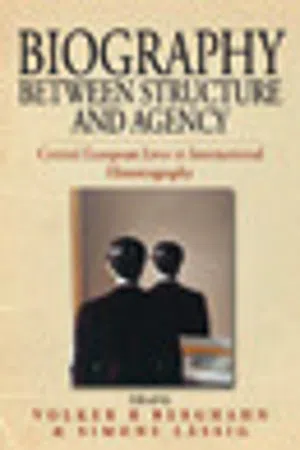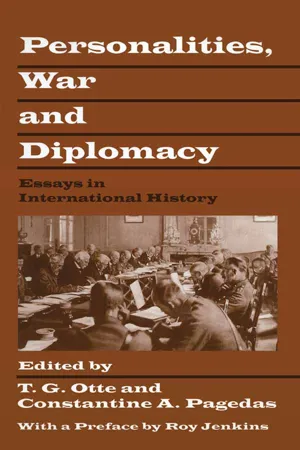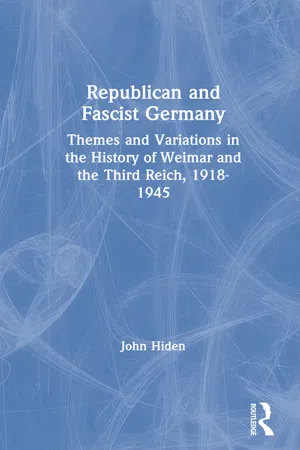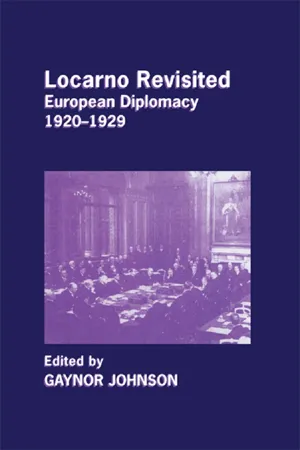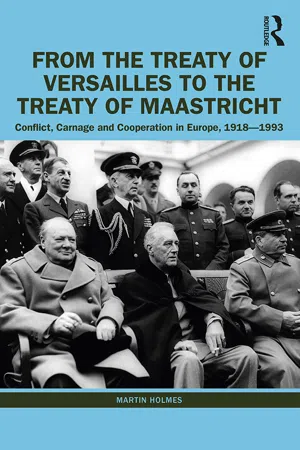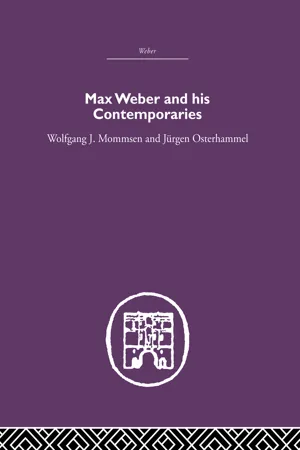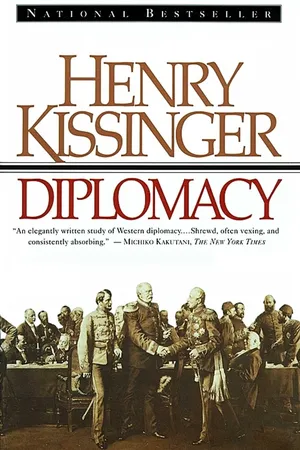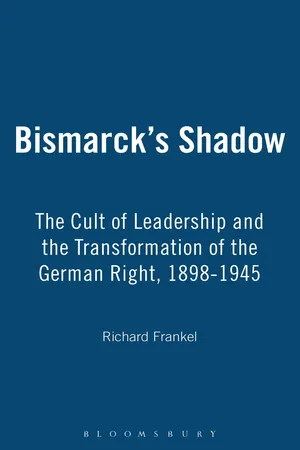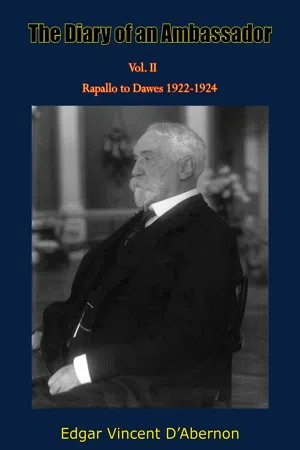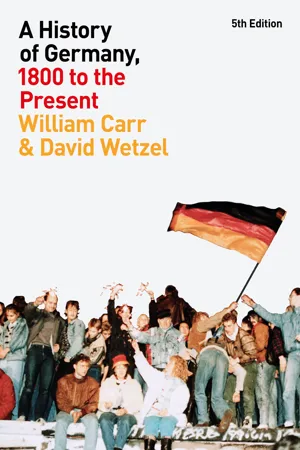History
Gustav Stresemann
Gustav Stresemann was a prominent German statesman and politician during the Weimar Republic. He served as Chancellor in 1923 and later as Foreign Minister, playing a key role in stabilizing the German economy and negotiating the Dawes Plan and the Locarno Treaties. Stresemann's pragmatic diplomacy and efforts to improve Germany's international standing earned him the Nobel Peace Prize in 1926.
Written by Perlego with AI-assistance
Related key terms
1 of 5
10 Key excerpts on "Gustav Stresemann"
- eBook - PDF
Biography Between Structure and Agency
Central European Lives in International Historiography
- Volker Berghahn, Simone Lässig, Volker Berghahn, Simone Lässig(Authors)
- 2008(Publication Date)
- Berghahn Books(Publisher)
Chapter 4 G USTAV S TRESEMANN : A G ERMAN B ÜRGER ? Karl Heinrich Pohl S To attempt to write about Gustav Stresemann today seems a rather foolhardy undertaking. In recent years, more than a dozen biographies have been published, including some that are extremely well-researched and extensive. Three have appeared since 2002 alone. 1 In this respect, Stresemann seems to be practically “over-researched.” Furthermore, there is evidently no need for a reassessment of his recognized place in history. The undisputed verdict on him and his politics has—so it would seem—been definitively reached. He has been received into the Walhalla of “positive” Germans of the twentieth century without great resistance. Moreover, he is virtually unchallenged in his role as a symbol of a positive Ger-man role model in the democratic, liberal, and parliamentary tradition from Weimar until the present. He is, therefore, one of the few (and consequently, “cherished”) political figures of the last century who can serve as a political and pedagogical model for the Federal Republic of Germany. 2 The heated debate about whether Stresemann was supposed to have been a sly and incorrigible monarchist or had evolved into a “reformed Republican” appears to be resolved once and for all. 3 There is hardly anyone who doubts his sincere commitment to parliamentary democracy. The wild “war-monger” of 1914 trans-formed himself—according to the new Stresemann orthodoxy—into a foreign policy realist. In his politics after 1923, Stresemann is said to have predominantly favored peaceful conflict resolution, promoted internationalism instead of na-tionalism, put his trust in cooperation, not confrontation, and placed joint accords above overwhelming unilateral power. 4 Stresemann is virtually honored as the “inventor” of a peaceful, liberal economic variant of German foreign relations, and as even a great European. - eBook - ePub
Personalities, War and Diplomacy
Essays in International History
- T.G. Otte, C. Pagedas, T.G. Otte, C. Pagedas(Authors)
- 2014(Publication Date)
- Routledge(Publisher)
4 Gustav Stresemann: Liberal or Realist? JONATHAN WRIGHT DOI: 10.4324/9781315037929-5Stresemann has an obvious claim to rank among those politicians who had a real influence on international politics. This is true both of his early career as a champion of ‘Greater Germany’ in the First World War and also of the period for which he is mainly remembered as Foreign Minister of the Weimar Republic from 1923 to 1929, when he helped to negotiate the Dawes Plan, the Locarno Pact and Germany's entry into the League of Nations. Interpretations of his record as Foreign Minister differ: was he genuinely seeking a stable, peaceful and democratic Europe within which Germany would play its part with France, Britain and the United States, while also acting as a bridge to the Soviet Union?1 Or was he merely adroitly adjusting his tactics to Germany's disarmed status but with his basic goal unchanged, namely to make Germany the dominant European power?2 These different interpretations rely on different readings of his personality: in the first case an imaginative politician with an unusual ability to learn from his mistakes and the courage to take the possibility of European co-operation seriously, in the second a cunning and ruthless leader who spoke the language of Europe but thought only of Germany. Both interpretations share the view that Stresemann was a realist: in the first case, realism led him to see that Germany's overriding interest was peace; in the second, realism led him to adjust policy to the means available but without swerving from the view that politics is about power and international politics about dominance. It is as if the two major schools of international relations theory, Liberal and Realist, are competing for the soul of Stresemann and, as in the academic debate between them, both claim that they are the true realists.3 - eBook - ePub
Republican and Fascist Germany
Themes and Variations in the History of Weimar and the Third Reich, 1918-1945
- John Hiden(Author)
- 2020(Publication Date)
- Routledge(Publisher)
The plain fact was that, first as Chancellor and then as Foreign Minister, he could only make progress by working with the Allied powers to restore Germany’s international position. The policy had been sketched by Wirth and others; key socio-economic and political groups in Germany were prepared to sustain it. What Stresemann brought to the task was an exceptional clarity of thought and overall purpose, impressive negotiating skills and the remarkable application which would ruin his health and eventually claim his life. Last but by no means least, Stresemann was able to broaden the domestic base for Verständigung through his commanding leadership of the German People’s Party (Deutsche Volkspartei - DVP). Since the overall composition of Weimar governments from 1923 was broadly conservative, his influence was all the more pervasive. Stresemann was the first Foreign Minister in the Weimar Republic who enjoyed enough party political clout to shield the conduct of foreign policy from the worst excesses in the Reichstag. His peaceful and statesmanlike methods have long been acknowledged but by no means all historians have been dissuaded from arguing that his ‘peaceful’ revisionism prepared the ground for Hitler’s diplomacy. Was not the ‘nationalistic’ pursuit of restoring full German power in Europe common to both? 29 It is worth reiterating the point already made, that the urge to promote national interests was shared by all European leaders. The question of what policy methods were employed is therefore neither instrumental nor secondary, but of fundamental importance. Methods, in affecting the conduct of Weimar foreign policy, influenced its nature and ultimately its ends. In personal terms, could Stresemann not be a good German as well as a perfectly good European? 29. Cf. K. Hildebrand, The Foreign Policy of the Third Reich (London, 1973), p - eBook - ePub
Locarno Revisited
European Diplomacy 1920-1929
- Gaynor Johnson(Author)
- 2004(Publication Date)
- Routledge(Publisher)
The predominant influence on his teachers both in Berlin and Leipzig was the school of political economy, centred on the Verein für Sozialpolitik (Association for Social Policy), of which Gustav Schmoller, whose lectures he attended in Berlin, was the leading exponent. Its aim was to produce an overall view of the development of economic life from the earliest times, combining the skills of economists, historians and sociologists, to establish a German tradition of political economy to rival those of France and Britain. From it Stresemann gained a thorough knowledge both of political history and of the development of a modern industrial economy and the social theories which sought to explain and reform it. He also acquired a particular view of German society as a whole and a sense of the responsibility of an educated elite towards it. This was accompanied by pride in Germany's achievements and its still growing importance in the world— Schmoller was a supporter of the fleet and colonial expansion. After university, he became a ‘Syndic’, that is he was employed by an organisation which represented the interests of a particular branch of industry. In Stresemann's case this was the Verband Sächsischer Industrieller (Association of Saxon Industrialists) based in Dresden which he built up from an organisation representing some 180 firms to 5,740 by 1914, with over half a million employees. This success made his name and helped to launch his political career. From our point of view, the interesting feature is that the businesses Stresemann represented were overwhelmingly exporters. They were generally small-scale manufacturing firms in skilled and specialist products—textiles, lace, leather goods, printing, iron works, chemical products. They were highly dependent on the international economy both for markets and for imports, for instance of cotton. Their interests were generally opposed to the coal and steel giants of the Ruhr - eBook - ePub
From the Treaty of Versailles to the Treaty of Maastricht
Conflict, Carnage And Cooperation In Europe, 1918 – 1993
- Martin Holmes(Author)
- 2022(Publication Date)
- Routledge(Publisher)
3Stresemann to Hitler
German foreign policy
DOI: 10.4324/9781003260998-4The Oxford University historian A.J.P. Taylor observed that there were two German problems between the world wars. The first, up to 1933, was German weakness; the second, after 1933, was German strength. Even so, there was more continuity between the foreign policy of the Weimar Republic and the foreign policy of Adolf Hitler’s Third Reich than is often supposed. Both the Weimar government and the Hitler regime were opposed to the Treaty of Versailles. Both sought its fundamental revision, though in different ways.The Weimar foreign minister from 1923 to 1929, Gustav Stresemann, favoured reconciliation with France, particularly to facilitate a series of international agreements to revise the Versailles Treaty. Politically difficult to place, he was regarded as on the left at the start of World War I before moving right through monarchy to liberalism. It is as a liberal leader of the German People’s Party that he was best known. Stresemann was an opponent of communism and suspicious of social democracy. The ultimate networker of Weimar politics, he cultivated foreign statesmen as a way of generating sympathy for Germany’s plight as a result of Versailles. The high watermark of his diplomacy was probably his success in persuading American banks to alleviate the economic burden of reparations. This culminated in the Dawes Plan and the Young Plan to reschedule reparation payments and diplomatically was no mean feat. So popular and successful was his reconciliatory approach that he won the Nobel Peace Prize in 1926. The fact that the French trusted him led to the 1925 Locarno Treaty which allowed the evacuation of Allied troops from the Rhineland plus German admittance to the League of Nations. Stresemann opposed the use of force, thus removing from negotiations the threat that Germany would embark on a remilitarisation leading to war. And therein lay the difference between Stresemann and Hitler. While both opposed the Versailles Treaty and wanted it overhauled, for Stresemann, this was an entirely diplomatic process; for Hitler, it was about rearmament, the threat of military force, then the use of military force, culminating in World War II.1 - eBook - ePub
- Wolfgang J. Mommsen, Jurgen Osterhammel, Wolfgang J Mommsen(Authors)
- 2013(Publication Date)
- Routledge(Publisher)
21 Gustav Stresemann and Max Weber: Politics and Scholarship
Gangolf Hübinger DOI: 10.4324/9780203708644-21If we measure the career of Gustav Stresemann against the ideal-typical virtues of the political leader, as Max Weber defined them, then the result is extremely ambivalent. On the one hand, Weber believed politicians such as Stresemann to be indispensable for the establishment of a capitalist society organized along liberal-bourgeois lines. For, in such a society, the interpenetration of politics and economics is constantly growing: ‘Politics is penetrating into the economic order at the same time that economic interests are entering into politics.’1 On the other hand, it is precisely in Stresemann that Weber diagnosed characteristics of political behaviour that he vehemently rejected on ethical grounds, such as tactical manoeuvring, a readiness to compromise, opportunism, sinecurism and an advocacy of limited and particular interests. All this contrasts sharply with Weber’s ideal of a life guided by an ethic of responsibility and oriented towards the political welfare of the whole nation.The relationship between Weber and Stresemann is shaped by the tensions between Weber’s ideal types of the career politician, on the one hand, and the actual career patterns of professional politicians in late-Wilhelmine Germany, on the other. There was no personal relationship between the two men, but rather the mutual attention paid to each other by two personalities prominent in public life. Weber was esteemed as one of the most perceptive and farsighted analysts of political and social conditions in the Kaiserreich;2 Stresemann, under precisely these conditions, developed to become a political leader of European stature.3 At the same time both were prominent representatives of the conflicting camps within the liberal Wilhelmine bourgeoisie. Stresemann, who made his career as a legal adviser (Syndikus) to business associations, represented the values and interest of industry.4 Weber represented and upheld the values and norms of an academic middle class (Bildungsbürgertum) that was undergoing metamorphosis under the impact of advanced industrialization; as an academic and politician (Gelehrtenpolitiker) he fought to get these values accepted.5 - eBook - ePub
- Henry Kissinger(Author)
- 2011(Publication Date)
- Simon & Schuster(Publisher)
6His colleagues, however, thought Great Britain too exhausted to pursue such a course. Foreign Secretary Austen Chamberlain replied wearily that “vengeance was too expensive these days.”7As Lloyd George had predicted, the new Weimar Republic was from the outset besieged by nationalist agitators, even though it had been granted peace terms far more generous than what the military high command could have obtained. Germany’s new democratic leaders received no credit for preserving their country’s substance under the most difficult of circumstances. In politics, however, there are few rewards for mitigating damage because it is rarely possible to prove that worse consequences would in fact have occurred.Just as, two generations later, it took a conservative American president to engineer America’s opening to China, only a leader with the impeccable conservative credentials of Stresemann could have even thought of basing German foreign policy on cooperating, however ambivalently, with the hated Versailles settlement. The son of a beer distributor, Stresemann was born in Berlin in 1878 and had built his political career by espousing the views of the conservative, pro-business bourgeois National Liberal Party. He became its leader in 1917. A man of great conviviality, he loved literature and history, and his conversations were frequently sprinkled with allusions to German classics. Nevertheless, his early views on foreign policy reflected the conventional conservative wisdom. For example, he was convinced that Germany had been lured into the war by a jealous Great Britain eager to preserve its own primacy.As late as 1917, Stresemann had advocated vast conquests in both the East and the West, as well as the annexation of French and British colonial possessions in Asia and Africa. He had also supported unrestricted submarine warfare, the calamitous decision which brought America into the war. That the man who had called the Treaty of Versailles “the greatest swindle in history”8 should initiate a policy of fulfillment seems a strange turn of events only to those who believe that Realpolitik - eBook - PDF
Bismarck's Shadow
The Cult of Leadership and the Transformation of the German Right, 1898-1945
- Richard Frankel(Author)
- 2004(Publication Date)
- Berg Publishers(Publisher)
At speech after speech during the congress, rep-resentatives acknowledged the first chancellor as inspiration and model for their assault on the republic. ‘Back to Bismarck’, though, meant several different things. With regard to foreign policy, it meant a break with the timid, un-German practice of fulfillment and a return to an assertive position that sought to regain Germany’s freedom of maneuver. According to DNVP leader Oskar Hergt, Chancellor Wilhelm Marx’s claim that the government’s policy was not one of fulfillment, but rather of liberation, was simply untrue. What the German people had before them was merely an illusory freedom, which they traced back to the earliest manifesta-tion of “ Stresemannpolitik .” “More than ever have the government measures in this period been draped in the national mantle although they are only a second version of the old Erfüllungspolitik in more careful form.” 16 The German Nationalists demanded an immediate and forceful offensive for revision of Versailles – the exact opposite of Stresemann’s tactic. Concern for how other countries might react to the composition of parliament or the government can no longer concern the German voter. “For the new government of the right, only the old word of Bismarck may be valid: ‘We Germans fear God and nothing else in the world’.” 18 Stresemann and his German People’s Party, however, were not about to leave the field to their rivals unchallenged. Perhaps like no other individual in Weimar, Gustav Stresemann tied himself, his politics, and his party to the image of Bismarck. Aside from the Nazis, few other parties had such a dominant person-ality as leader and few, if any, other parties used the image of their leader in elec-tion propaganda to the extent that the DVP did. In one election poster after another, Stresemann’s image stood front and center, often with Bismarck’s somewhere in the background. - eBook - ePub
The Diary of an Ambassador Vol. II
Rapallo to Dawes 1922-1924
- Edgar Vincent D'Abernon(Author)
- 2018(Publication Date)
- Papamoa Press(Publisher)
CHAPTER XV — NOVEMBER-DECEMBER, 1923 Why Stresemann’s Government fell—Political confusion in Germany—Lord Curzon’s threat to withdraw British Member of Ambassadors’ Conference—Three German Chancellors—Stresemann on Ebert—Rumours of suggested German-Italian Alliance—Mark stabilization at last—British Premiers and Paris visits—When did L. G. realize change in French policy?—Stresemann’s difficulty in finding rest—Personal relations with Stresemann—Can Germany be trusted?—Future relations between England and Germany—British policy and continental Europe—English influence and French influence in Central Europe—British prestige and how to preserve it—The year of crisis: gravity of dangers passed through in 1923 BERLIN, November 24, 1923.—The newspapers here are inclined to attribute Stresemann’s fall to the fact that he trimmed too much and tried to catch the wind from too many quarters. While this is to a certain extent true, it is no less true that if he had trimmed less he would have fallen sooner. It was only by his vigorous action in Dresden and Thuringia that he avoided dismissal at the hands of the Right and of the Conservative section of the Volkspartei. Stresemann’s view that by this vigorous action he would be able to pacify the Bavarians and the adherents of Bavaria in North Germany was to a considerable extent realized. The mistake in calculation which he made was in thinking that the Socialists would be unwilling to dismiss him and risk a still more Conservative Government as his successor, that they would tolerate his strong action in Saxony and Thuringia and would, in the last resort, abstain from voting. Had they done so he would have had an adequate majority formed of the Volkspartei, the Centre, and the Democrats, as against a minority composed of Deutsch-Nationals and Communists - eBook - ePub
- William Carr, David Wetzel(Authors)
- 2023(Publication Date)
- Bloomsbury Academic(Publisher)
Stahlhelm , and the National Socialists was formed to promote a law “against the enslavement of the German people,” which would oblige the government to repudiate war guilt and secure the immediate evacuation of occupied territory (how this could be done was not explained); finally, ministers who signed agreements such as the Young Plan were to be prosecuted for treason. The extremists succeeded in obtaining the bare 10 percent of the electorate’s support required for the submission of their absurd “freedom bill” to the Reichstag. Here it was ignominiously defeated, and in the subsequent referendum only 13.8 percent of the electorate supported the bill. Hugenberg’s irresponsible campaign had failed miserably. Some of the more able Nationalists broke with the party, thoroughly disgusted by the campaign’s blatant vulgarity and dishonesty.The real victor was Adolf Hitler. The campaign came at a most opportune moment for this small-time Bavarian politician, whose party had only secured twelve seats in the 1928 elections. Overnight Hitler became a national figure, and for the first time his propaganda reached hitherto inaccessible middle-class circles, thanks to Hugenberg’s vast press network. Having extracted the maximum publicity out of the campaign, Hitler simply severed his connection with elements he regarded as “reactionary” and went his own way again.In retrospect, Stresemann’s death can be seen as marking the end of postwar international reconciliation. The collapse of the Wall Street Stock Exchange in October 1929 was the beginning of the end of the tinsel prosperity of Western Europe. The collapse of the American economy was to have particularly serious political and economic consequences in Germany. We already have had occasion to observe Germany’s economic recovery and relative prosperity in the later 1920s. Under the Dawes Plan Germany had paid approximately 8 billion marks in reparations and had borrowed the equivalent of 23 billion marks, about half of it from American investors attracted by high interest rates. Thus the German economy rested on a perilously insecure economic foundation. The situation was rendered even worse by the fact that approximately half of Germany’s borrowed money was in the form of short-term credits, which German banks, with misplaced confidence in the continued economic recovery, had lent out as long-term credits. Worse still, much of this borrowed money had not been invested in economically productive enterprises, but had been used to pay instead for public works programs—housing, schools, hospitals, for example—whereby German political leaders and regional authorities had hoped to bolster their own political fortunes and, more generally, to generate support for Germany’s postwar republican regime.
Index pages curate the most relevant extracts from our library of academic textbooks. They’ve been created using an in-house natural language model (NLM), each adding context and meaning to key research topics.
